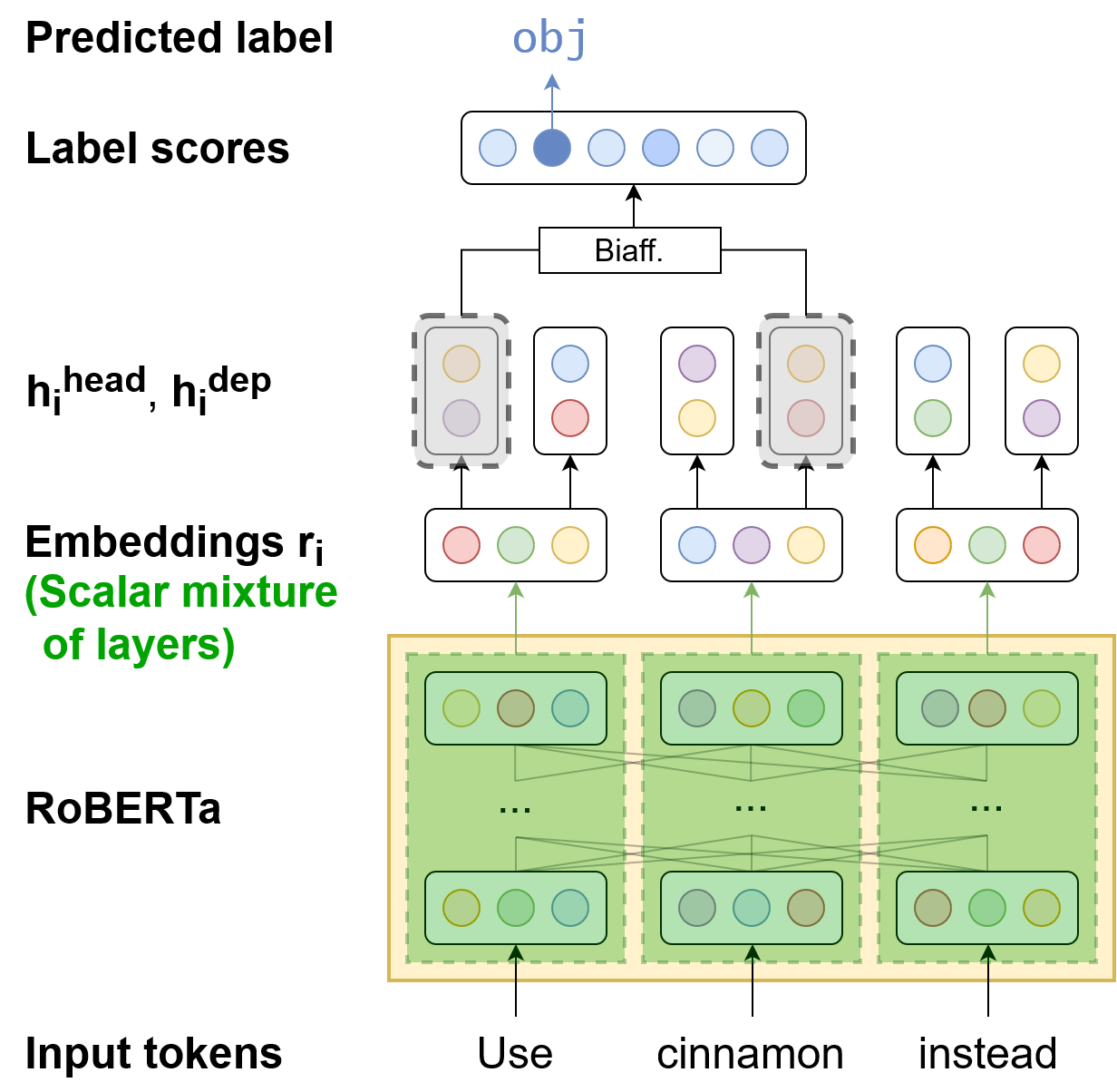This repository contains the companion code for RobertNLP, the Enhanced Universal Dependencies parser described in the paper
The code allows users to reproduce and extend the results reported in the study. Please cite the above paper when using our code, and direct any questions or feedback regarding our parser at Stefan Grünewald.
This software is a research prototype, solely developed for and published as part of the publication cited above. It will neither be maintained nor monitored in any way.
The repository has the following directory structure:
robertnlp-enhanced-ud-parser/
configs/ Example configuration files for the parser
data/
corpora/ Folder to put training/validation UD corpora
ewt/ Folder for EWT corpus files
vocab/ Vocabulary files for EWT corpus
download_ewt.sh Script for downloading EWT corpus files
delexicalize_corpus.py Script for replacing lexical material in dependency labels with placeholders in an English UD corpus
pretrained-embeddings/ Folder for pre-trained word embeddings
download_embeddings.sh Script for downloading pre-trained word embeddings
saved_models/ Folder for saved models
download_models.sh Script for downloading trained parser models (forthcoming)
src/
data_handling/ Code for processing dependency-annotated sentence data
logger/ Code for logging (--> boring)
models/ Actual model code (parser, classifier)
embeddings/ Code for handling contextualized word embeddings
pre_post_processing/ Dependency graph pre-/post-processing (as used in IWPT 2020 Shared Task)
trainer/trainer.py Training logic
init_config.py Initialization of model, trainer, and data loaders
parse_corpus.py Main script for parsing corpora using a trained model
train.py Main script for training models
environment.yml Conda environment file for RobertNLP
parse_raw_text.sh Script for parsing from raw text with heuristic post-processing (as used in Shared Task)
RobertNLP itself requires the following dependencies:
- Python >= 3.7.5
- PyTorch >= 1.3.1
- Huggingface Transformers >= 2.3.0
- PyConll >= 2.2.1
If you also want to perform the pre- and post-processing steps outlined in our paper, you will additionally need the following dependencies:
- StanfordNLP
- AllenNLP
- UDify (manual download required)
With the exception of UDify, you can install all of the above dependencies easily using Conda
and the environment.yml file provided by us:
conda env create -f environment.yml
conda activate robertnlpFor UDify, clone their repository into a location of your choice and download
their trained model (udify-model.tar.gz) into a location of
your choice. Then, see the section below for how to integrate the system into the parsing pipeline.
For simplicity, we have added scripts for downloading training/validation corpora as well as the pre-trained language models used in our system.
For the training/validation data (EWT corpus), use:
cd data/corpora/ewt/
./download_ewt.shFor the pre-trained language models, use:
cd data/pretrained-embeddings/
./download_embeddings.shNote: Since the model files are quite large, the downloads might take a long time depending on your internet connection. You may want to edit the download scripts in order to download only the particular models you are actually interested in (see comments in the respective scripts).
To train your own parser model, run python src/train.py [CONFIG_PATH].
Example: python src/train.py configs/roberta-base-768d.json.
If you are using one of the configuration files provided in this repository, the model checkpoints will be written
to saved_models/models/[MODEL_NAME]/[TIMESTAMP]/checkpoint_epochX.pth (where X is the epoch number).
The same folder will also contain the config.json that can then be used to load the model.
To parse a corpus of (segmented, pre-tokenized) sentences, run one of the following commands from the root directory of this repository:
- If your corpus is in text format (whitespace-tokenized, one sentence per line):
python src/parse_corpus.py [CONFIG_PATH] [SAVED_MODEL_PATH] [CORPUS_PATH] - If your corpus is in CoNLL-U format:
python src/parse_corpus.py --conllu [CONFIG_PATH] [SAVED_MODEL_CHECKPOINT_PATH] [CORPUS_PATH]
Parsed sentences will be written (in CoNLL-U format) to stdout.
Example: If you've trained a model based on the
roberta-large-1024d.jsonconfig and want to parse the development section of the EWT corpus using it, run:python src/parse_corpus.py --conllu data/saved_models/models/RoBERTa_large_1024d/[TIMESTAMP]/config.json data/saved_models/models/RoBERTa_large_1024d/[TIMESTAMP]/model_best.pth data/corpora/ewt/en_ewt-ud-dev.conllu
Note 1: Only the enhanced dependencies column will contain actual parser output. The basic dependency columns will be filled with placeholders, and the other columns (e.g. POS, lemma) will be left blank.
Note 2: Parsing corpora with this script will not perform any pre-processing (tokenization and sentence segmentation); the script expects tokenized and segmented text as input. Neither will it perform the heuristic post-processing "graph repair" steps described in our paper, which rely on the output of an external parser. A small number of the resulting dependency graphs may therefore be structurally invalid (i.e., contain nodes which cannot be reached from the root of the sentence). To reproduce our post-processing steps for the IWPT test data, please refer to the corresponding section below.
To exactly reproduce the approach used for our official submission to the IWPT 2020 Shared Task (including pre-processing and post-processing), follow these steps:
- Train a model using the
roberta-large-1024d.jsonconfig. - Open the
parse_raw_text.shscript in the main directory of this repository and set the values ofUDIFY_PATHandUDIFY_ARCHIVE_PATHto the respective locations on your hard drive. - Run
parse_raw_text.sh, providing a config file, a model checkpoint, and the raw text file you wish to parse, e.g.:./parse_raw_text.sh data/saved_models/models/RoBERTa_large_1024d/[TIMESTAMP]/config.json data/saved_models/models/RoBERTa_large_1024d/[TIMESTAMP]/model_best.pth [RAW_TEXT_FILE]
The script will first tokenize and sentence-segment the input text file using StanfordNLP, then parse the tokenized text
using your trained model, and finally post-process the resulting dependency graphs using UDify.
Output of the parsing process will be written (in CoNLL-U format) to a new file parsed.conllu.
The RobertNLP parser is open-sourced under the BSD-3-Clause license. See the LICENSE file for details.
For a list of other open source components included in RobertNLP, see the file 3rd-party-licenses.txt.
The software, including its dependencies, may be covered by third party rights, including patents. You should not execute this code unless you have obtained the appropriate rights, which the authors are not purporting to give.

